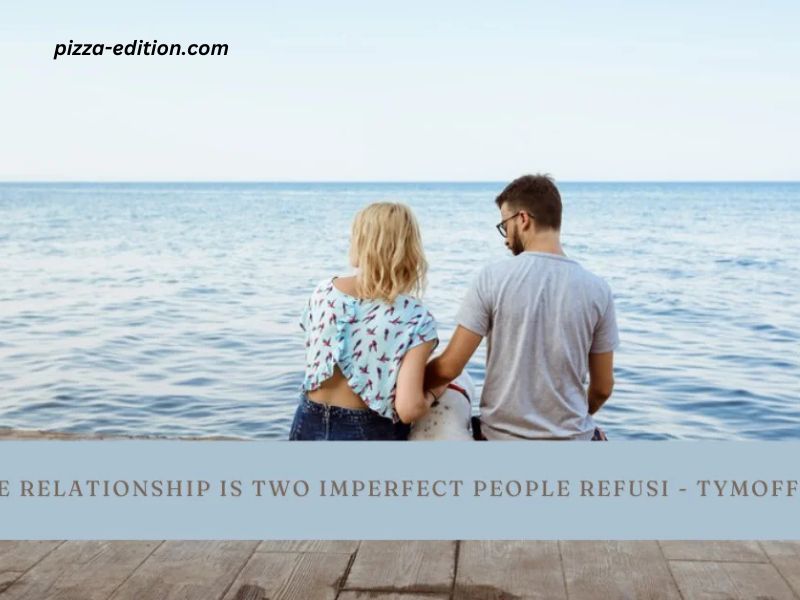The concept of love is multifaceted, often described through poems, songs, and tales of extraordinary, fairytale-like unions. Yet, behind these idealized portrayals lies the truth that all relationships, no matter how perfect they may seem on the surface, are built on the foundation of imperfection. The phrase “A true relationship is two imperfect people refusing to give up” encapsulates a profound understanding of love and commitment. It suggests that relationships are not about finding perfection in another person, but about navigating the complexities of life and love with resilience, growth, and mutual understanding.
In this article, we will explore the meaning of this statement, how it applies to real relationships, and why it is an essential component of building a lasting and meaningful connection with another person.
The Imperfection of Being Human
Humans are inherently imperfect. Our flaws, quirks, and vulnerabilities are what make us who we are. From childhood to adulthood, we are constantly evolving, shaped by our experiences, choices, and challenges. And this journey of growth is rarely linear. Everyone carries emotional baggage, past wounds, and unhealed scars that influence their decisions, relationships, and behaviors. These imperfections, however, do not diminish our worth; instead, they are part of the intricate web that makes us unique individuals.
When we enter a relationship, we bring these imperfections with us. In a healthy and genuine relationship, both partners recognize and accept that neither of them is flawless. This understanding is crucial because it opens the door for vulnerability, honesty, and genuine connection. A person who feels the need to hide their flaws may struggle to form a true, intimate bond. However, when two people are able to openly share their vulnerabilities, they create a deeper and more meaningful connection.
A relationship based on perfectionism is ultimately an illusion. The quest for perfection can lead to frustration, disappointment, and resentment, as it ignores the human condition in favor of an unattainable ideal. It is when we embrace our flaws—and those of our partner—that the real beauty of a relationship unfolds. The ability to accept each other as imperfect beings is the first step toward a lasting relationship.
The Power of Resilience in Relationships
One of the most beautiful aspects of a strong relationship is resilience—the ability to bounce back from adversity, overcome challenges, and remain committed to one another despite difficulties. Relationships, by nature, will encounter problems. From communication breakdowns to misunderstandings, disagreements, and external pressures, these challenges are inevitable. However, what sets resilient couples apart is their commitment to working through these challenges together, rather than giving up at the first sign of trouble.
The phrase “refusing to give up” in the context of a true relationship speaks to the core of resilience. It suggests that the strength of a relationship is not measured by its ability to avoid conflict or struggle, but rather by the determination of both partners to stick together and work through their issues. This doesn’t mean enduring toxic or harmful behaviors—healthy relationships involve mutual respect, communication, and boundaries—but it does imply that both partners are willing to put in the effort to make things work even in difficult times.
Resilience in a relationship is a learned skill. It involves patience, empathy, and the willingness to understand your partner’s perspective. It also requires a great deal of emotional intelligence—recognizing when a situation requires compromise and when it demands a more direct approach. There will be moments when a couple might feel like giving up, but true resilience is found in the decision to face these moments together, with the belief that both individuals can grow and overcome the obstacles they face.
Growth Together, Not Apart
A healthy relationship is one that fosters growth, both individually and as a couple. Growth is not just about overcoming external challenges, but also about evolving together as people. The imperfection of both partners can act as a catalyst for growth if both individuals are committed to bettering themselves for the sake of the relationship.
One of the key aspects of growth in relationships is communication. Imperfect people are often prone to misunderstandings and miscommunications. However, it is through open, honest, and empathetic communication that partners can learn from their mistakes, heal old wounds, and find solutions to problems. The willingness to listen, truly understand each other, and articulate feelings and concerns is essential for growth.
Growth in a relationship also means being able to evolve together. As individuals grow, their needs, desires, and expectations may shift. A true relationship is one in which both partners support each other’s personal development. Whether it’s pursuing new career goals, navigating personal crises, or adapting to changes in life, growth involves a continuous process of adapting and changing together.
In many ways, the journey of growth within a relationship mirrors the process of self-improvement. Just as individuals work on themselves to become better versions of who they are, so too must couples work together to strengthen their bond and deepen their connection. This process requires patience, understanding, and a shared vision for the future. True growth in relationships is about becoming the best versions of yourselves both as individuals and as a unit.
The Role of Empathy and Understanding
Empathy plays a crucial role in any relationship. It involves being able to put yourself in your partner’s shoes, to understand their emotions, and to offer support when they are struggling. In a relationship where both individuals are aware of their imperfections, empathy becomes the glue that holds them together.
When we acknowledge that neither of us is perfect, it becomes easier to forgive mistakes and offer grace. It allows us to view our partner’s flaws not as faults but as part of their unique personality. In times of conflict or misunderstanding, empathy allows for deeper conversations and a mutual understanding of the feelings at play.
Empathy also strengthens trust. Knowing that your partner understands your vulnerabilities and accepts your imperfections creates a sense of safety and security. In turn, this fosters a deeper sense of intimacy and emotional connection. As a relationship grows, the ability to empathize with one another becomes increasingly important, especially when faced with significant challenges.
Love Beyond Perfection
A common misconception about relationships is that love should always feel easy, effortless, and perfect. While love can be a beautiful, transcendent experience, it is not always without effort or struggle. In fact, the most enduring love stories are often those in which both partners face hardships and obstacles but choose to stay together and work through them.
True love is not about finding someone who meets all your needs or adheres to an idealized image of perfection. Rather, it is about finding someone with whom you can be vulnerable, share your flaws, and grow together. It is about refusing to give up when times are tough and choosing to invest in each other’s happiness, even when life becomes complicated.
The true test of love comes not in moments of ease, but in moments of hardship. It is when both partners stand by each other, refusing to give up on their shared dreams and commitment, that love truly flourishes.
Conclusion
A true relationship is not about two flawless individuals coming together in harmony. It is about two imperfect people choosing to love each other despite their flaws, refusing to give up on each other when challenges arise, and growing together in the process. It is about resilience, empathy, and a deep commitment to supporting one another through life’s ups and downs.
In the end, imperfection is not a hindrance to love; it is a testament to the strength of the bond between two people. A relationship that thrives on mutual understanding, respect, and a refusal to give up will withstand the test of time, weathering any storm and growing stronger with each passing day. True love is not perfect, but it is powerful, enduring, and transformative—just like the two people who choose to nurture it every day.




